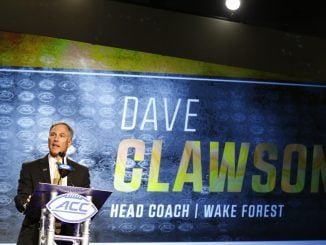
RALEIGH — Last month, the Foundation for Individual Rights and Expression released the results of its faculty survey that show free speech on campus is still a struggle.
The Foundation for Individual Rights and Expression’s (FIRE) report included feedback from 6,269 faculty members spanning 55 four-year colleges and universities.
The report states that 87% of faculty find it hard to have an open and honest conversation on campus on political topics, including 70% pointing to the Israel-Palestine conflict as a major problem.
Additionally, many of the survey participants reported self-censorship.
Twenty-eight percent said they at least occasionally hide their political beliefs in order to keep their job, including a majority of conservative faculty (55%). Thirty-five percent reported toning down their writings to avoid controversy — only 9% of faculty said the same during the McCarthy era of the late 1940s and ’50s.
Additionally, the report says 14% of faculty suffered discipline or threats of discipline for either their teaching, research, academic talks or other off-campus speech, and 27% of faculty feel unable to speak freely for fear of how students, administrators or other faculty would respond.
Other results include 71% indicating that a liberal faculty member would fit in well in their department, but only 20% said the same of a conservative addition.
On the topic of diversity, equity and inclusion (DEI), 50% of faculty said mandatory DEI statements are “rarely” or “never” acceptable, with 66% opposing universities making political statements.
Three North Carolina institutions were included in the survey: Duke, UNC Chapel Hill and Wake Forest.
UNC’s survey results included 145 faculty members, with 15% reporting they frequently cannot express their views due to potential negative responses from others, and 37% said they recently toned down something they wrote for fear of causing controversy.
Additionally, 15% said they had been disciplined or threatened with discipline over speech.
The survey also revealed that 65% support the adoption of institutional neutrality.
Most UNC respondents, 56%, said using DEI statements in hiring was justifiable. That figure represents 36% who said such statements are “often or always” justifiable and 20% who said sometimes those types of pledges were justifiable. Conversely, 44% said a DEI statement was rarely or never justifiable.
The UNC Board of Governors, which oversees all of the state’s universities, repealed and replaced its DEI programs earlier this year while directing schools to focus on institutional neutrality. Related staff and program cuts totaled more than $17 million. The funds are being redirected to other programs and UNC System needs.
FIRE’s survey questions on hot-button topics that are difficult to discuss included the Israeli-Palestinian conflict (79%), affirmative action (54%) and racial inequality (53%).
Pro-Palestine protests occurred on the UNC campus last year, resulting in arrests as well as national attention when Pi Kappa Phi fraternity brothers raised the U.S. flag that had been taken down by demonstrators.
Results for Duke included 80 faculty members, with 41% reporting they recently toned down something they wrote to avoid potential controversy, and 14% had been disciplined or threatened with disciplinary action.
Seventy-one percent believe the school should adopt institutional neutrality.
Duke faculty members’ responses on DEI statements found that 61% said they are never or rarely justifiable, 10% saw them as sometimes justifiable, and 29% viewed them as often or always justifiable.
The top most difficult topics to discuss were similar to those of UNC: Duke responses listed the Israeli-Palestinian conflict (68%), affirmative action (57%) and transgender rights (51%).
Wake Forest had 55 participants in the survey, 38% of whom toned down something they wrote out of fear of controversy and 23% of whom had been disciplined or threatened with discipline.
Regarding DEI statements in hiring, 42% found it never or rarely justifiable, while a combined 58% found it sometimes or always justifiable.
Sixty-four percent support institutional neutrality.
The top three difficult issues to discuss on the Wake Forest campus were the Israeli-Palestinian conflict (71%), racial inequality (63%) and transgender rights (55%).



